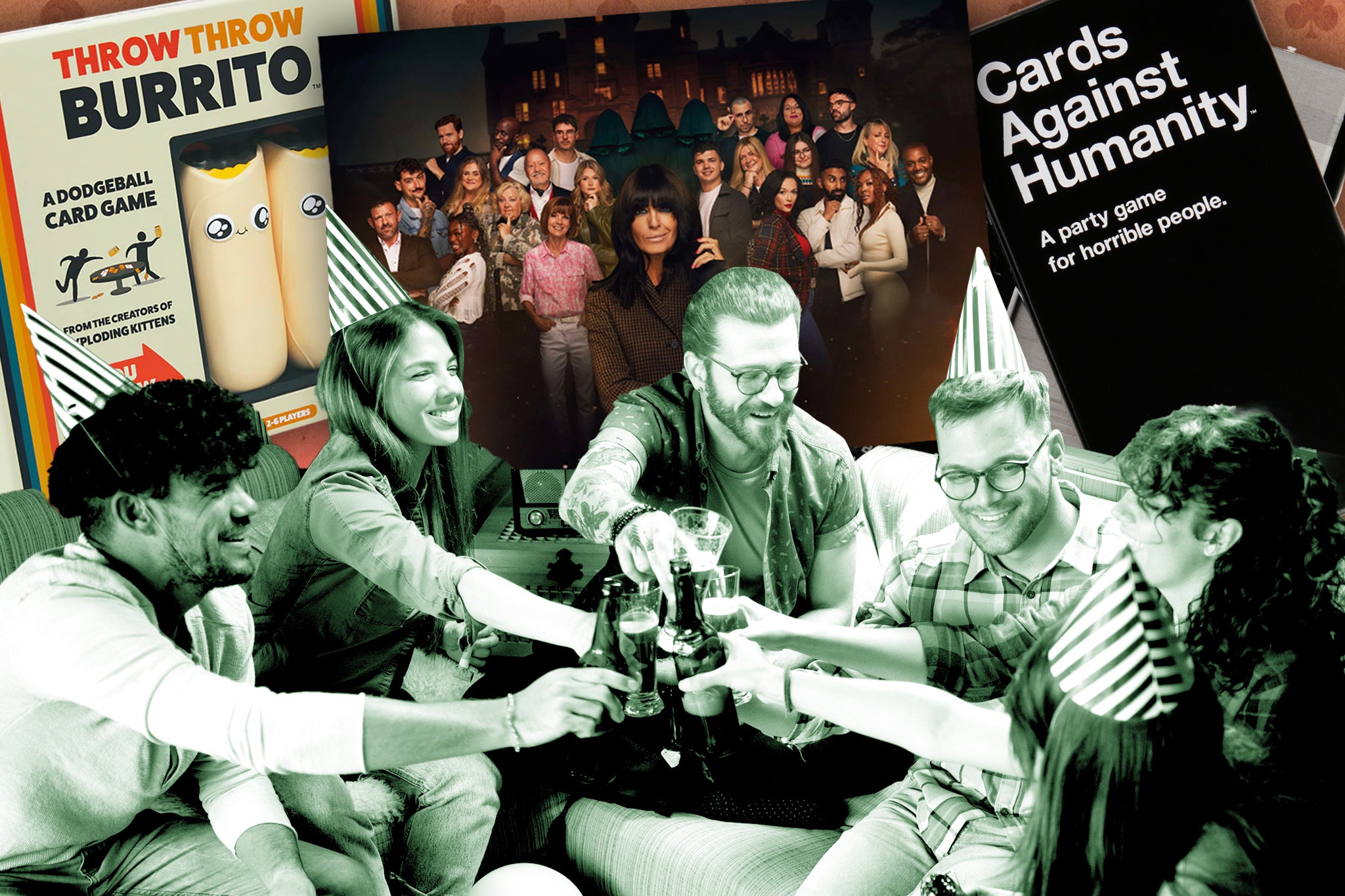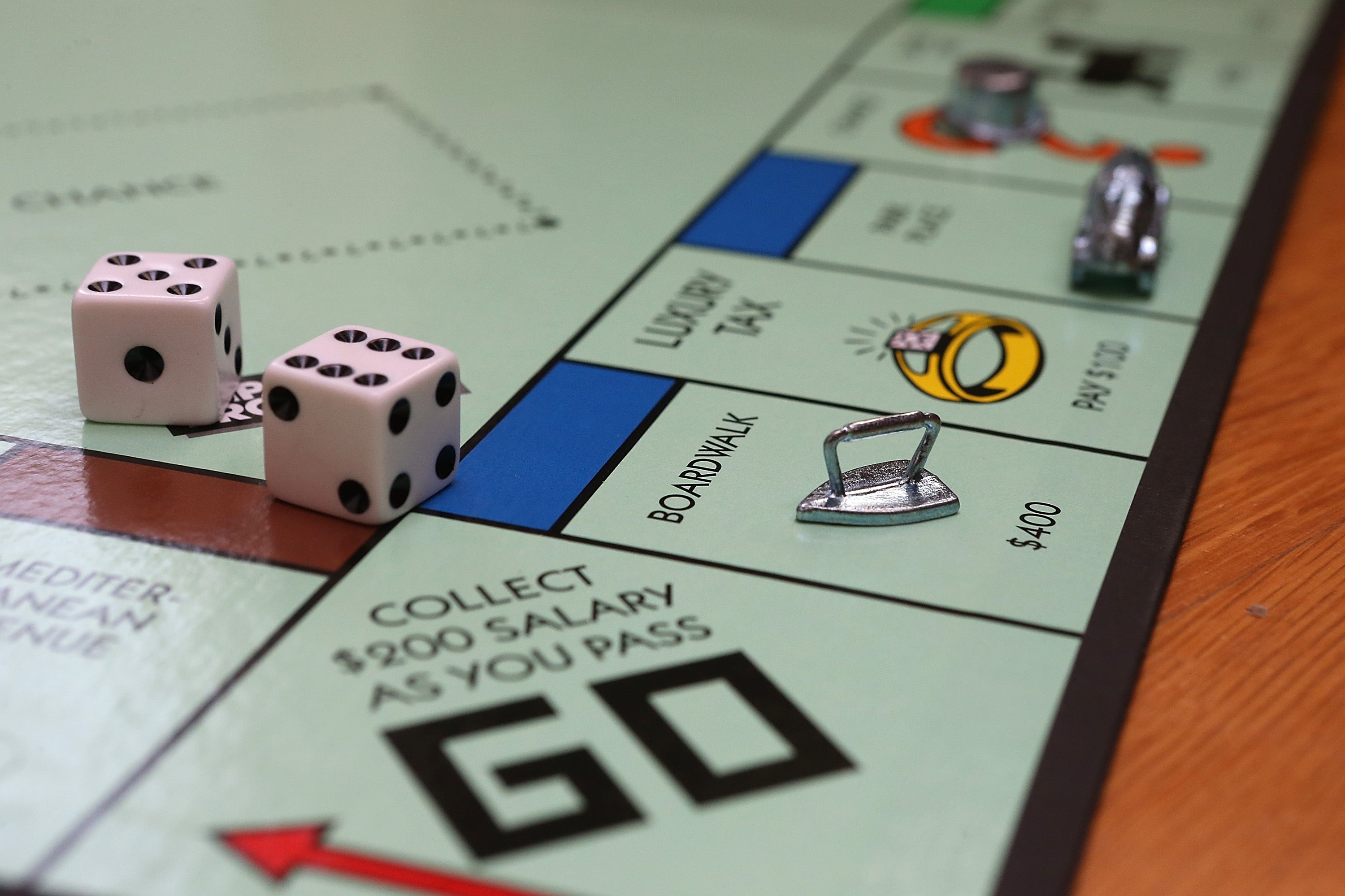‘They’ve become cool again’: The Traitors and our renewed love of party games
The games scene has gone from naff or tedious options that only serve to cause tension at family gatherings, to a booming industry of challenges that require players to possess charm, cunning and skills of deduction. Isobel Lewis investigates our renewed love of a very traditional pasttime


Your support helps us to tell the story
From reproductive rights to climate change to Big Tech, The Independent is on the ground when the story is developing. Whether it's investigating the financials of Elon Musk's pro-Trump PAC or producing our latest documentary, 'The A Word', which shines a light on the American women fighting for reproductive rights, we know how important it is to parse out the facts from the messaging.
At such a critical moment in US history, we need reporters on the ground. Your donation allows us to keep sending journalists to speak to both sides of the story.
The Independent is trusted by Americans across the entire political spectrum. And unlike many other quality news outlets, we choose not to lock Americans out of our reporting and analysis with paywalls. We believe quality journalism should be available to everyone, paid for by those who can afford it.
Your support makes all the difference.It’s an unidentifiable day in the liminal space between Christmas and new year. People are full of cheese and winter colds passed between family members. Then someone pulls out a board game, and the world inhales. Will this game unite grumpy grandparents with tech-loving teenagers, bringing loved ones together in a scene of joy and goodwill only seen in Nativity scenes or Hallmark movies? Or will it sow further seeds of resentment, leading to Monopoly boards thrown across the room or parents falling asleep during a particularly tedious game of Risk? Each attempt is a roll of a dice in itself.
Many of us will recognise this scenario. For a long time, board games have been seen as a cause of tension at gatherings, or as simply a bit naff. Think of games, and you likely imagine inscrutable instructions with glacial play and tiny pieces sure to get lost down the sofa. But for people in the know, table-top gaming has been experiencing a resurgence. A new generation of games has emerged, pacy enough to prevent punters from picking up their phones. It’s a lucrative field to be in. In 2017, the global market was valued at £5.6m. By the end of 2023, it was predicted to reach £9.42m.
Riding this wave of popularity is the BBC’s hit reality series The Traitors. This TV show, itself inspired by party games such as Werewolf or Mafia, has now been turned into a branded board game, on sale for £26.99. The Traitors began life in the Netherlands before it was transposed for UK audiences at the tail-end of 2022. It was a word-of-mouth hit, swiftly becoming one of the year’s most talked-about TV moments.
As with the paranoia-inducing party games that inspired it, the premise is simple enough, yet can push players to the edge. Twenty-two strangers arrive at a Scottish castle, where they’re secretly split into two camps. A small number are the “traitors”, working together to “kill” their fellow contestants while their identities remain undetected. The others? The “faithfuls” trying to catch them. Series one started a little slowly, but built to a historic final showdown leaving everyone in the room (including the show’s presenter/fringed overlord Claudia Winkleman) in tears.
Providing 2024 with a much-needed jump start, the show returns tonight for its highly anticipated second series. When I speak to executive producer Sarah Fay weeks before the launch, she tells me the series is still being pieced together in the editing suite like “a big old murder-mystery jigsaw”. Sure, there will be little tweaks and twists along the way, but they’re sticking with the game’s winning formula. That’s the key, she says: making the game the focus. “First and foremost, this is a psychological game, and then we’re filming on top of that,” she tells me. “It shouldn’t be the other way around.”
Werewolf, The Traitors and other social deduction games are rooted in one central idea: “bad guys” are among the players, and it’s down to the “good guys” to find them. You don’t necessarily need a fancy board game or set of cards – all it takes is a narrator to describe the action, and a group of players who trust each other enough to actually shut their eyes while the roles are allocated. The format has actually featured in popular culture before The Traitors. There was Among Us, the online game popular in the pandemic based on the same idea. And who can forget Secret Hitler, the board game where players are split into “liberals” and “fascists” and must try to “kill Hitler” from within the latter camp. Secret Hitler has been the catalyst for the majority of arguments among my friends – to the point where we’ve had to ban ourselves from playing it for years at a time. Calling your mate a fascist, it turns out, isn’t exactly conducive to warm and inviting friendships – even if it is kind of fun.

Since The Traitors has grown in popularity, it has spawned spin-off games “based on the hit BBC Show”, adding to the ever-growing list on offer each Christmas. It’s easy to put the growth of the industry down to the pandemic, when families and households were looking for any distraction from doom-scrolling. But table-top gaming was on the rise before then, with many of the biggest games of the 21st century emerging in the 2010s and board game cafes popping up across major UK cities. According to NPR, more than 4,000 board games (including card, dice and war games) are released every year. For Annie, a doctor living in Manchester, and her friends, they are the first form of entertainment everyone whips out at parties. “They’ve become cool again,” she says.
The re-emergence of board games is all the more impressive given the negative connotations many of us have with them. James Vaughan is the head of game development at Big Potato Games, the London-based company revolutionising the industry by making “games for people who don’t like games”. He, like many of the company’s staff, used to fall into that category, immediately shutting down requests to play because he’d “think of the board games from when we were kids: quite boring, takes forever, lots of rules to learn”.
With board games having been the hobby of (proudly) nerdier groups for years, there was a sense that the new one on the block to make them “cool” again would need to be the antithesis of those classics. Then one X-rated card game crashed onto the scene with two fingers raised firmly in the air at the board games of old. I am, of course, talking about Cards Against Humanity, the game with a 17+ age rating (gasp!) and one aim: be as offensive as you can be. Swiftly, young players were snared back into table-top gaming with poor-taste jokes about porn categories and Madelaine McCann. Countless similarly “shocking” games followed suit, from the internet-themed What Do You Meme? to the eye-rollingly “edgy” S*** Happens, F**k: The Game, and These Cards Will Get You Drunk.

The games that followed had less of a need to proclaim their intended street cred quite so loudly – although no one would call these releases, such as Secret Hitler or Exploding Kittens, tame. Crucially, however, the more controversial elements weren’t the entire selling point. The name Secret Hitler might raise a few eyebrows, but the game made it clear it wasn’t trivialising the rise of far-right politics. In the FAQ section on its website, anyone wanting to complain because they “don’t think there’s anything funny or cool about fascism” is offered a lengthy list of contact details for US senators to contact.
Naturally, the liberal v fascist angle of Secret Hitler conjures comedy of its own (one friend recalls a particularly heated game on a family holiday descending into chaos as he shouted at his 12-year-old sister that she was “definitely Hitler”). But social deduction games across the board scratch a certain satisfying itch in players. “They bring a lot of humour to proceedings, these types of game,” Fay says. “You think you know the people around you, but Nana in the corner could be literally lying to you.”
Tensions arise, too. Not everyone wants to deceive their loved ones – or they’d like to, but realistically know they wouldn’t be very good at it. Maintaining the lie for a game of Secret Hitler is one thing, but the lengthy process of filming The Traitors means such treachery can wear you down. The last remaining traitor of series one, Wilf, nearly stole the prize pot for himself, only to crack at the final moment under the pressure of deceiving his friends. But even in a more standard, offscreen social deduction game, the “intense” nature of play can be off-putting, Vaughan says. “It can be something that, if not handled quite carefully, can scare some people off,” he says.

As a result, the social deduction elements need to be handled “delicately”. Big Potato specialises in quick party games, so the Traitors-esque elements only exist in short rounds for games like word puzzle Chameleon. These shorter social deduction games are perfect for anyone nervous about this kind of format, Vaughan says, “because you’re going to be the liar, but only for five minutes. If you get caught, that’s fine. New round, start again.”
They bring a lot of humour to proceedings, these types of game
But in the end, the contents of the games – whether cooperative or combative – are secondary to the act of simply playing. For many people, the attraction of board games stems from the tangibility of the game. Just like vinyl records, film cameras and other items described as “retro” by Urban Outfitters, the fun comes from the tactile nature of table-top games – of moving pieces, trading cards, or, in the case of “dodgeball card game” Throw Throw Burrito, lobbing a cat-shaped toy at your friends.
While some games in the 2010s would incorporate phone play into the action, these are rarer now. Board games are a chance for people to get away from their phones: that’s the whole point. Vaughan tells me he originally wanted to work in video game design, associating video games with his childhood experiences of playing in the same room with his friends. Now, most video games are played alone, or with people over the internet. With board games and party games, the bare minimum is that you do have to be in the room with the other players. Whether you’re working as a team or lying to each other’s faces, well, that’s up to you to deduce…
Join our commenting forum
Join thought-provoking conversations, follow other Independent readers and see their replies
Comments